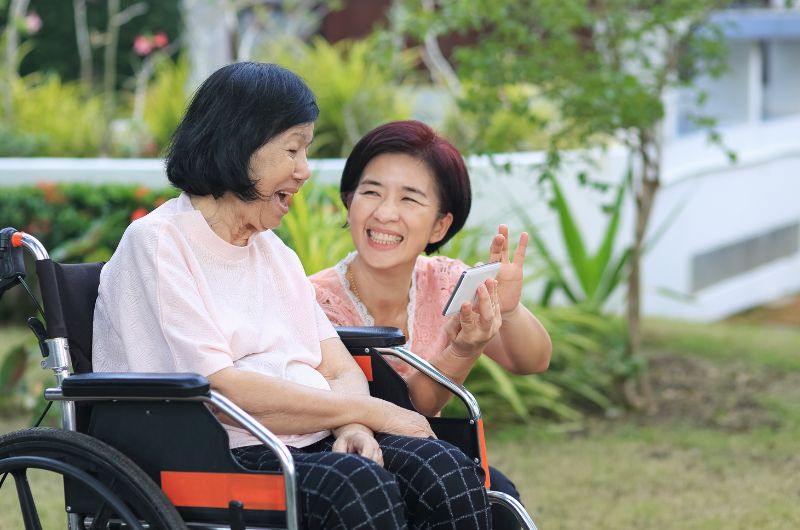When taking care of your elderly parents, don’t baby them. Remember, they’re your parents, who just need help with a few things. By creating boundaries and helping them keep their independence, you treat them as your parents, not children. Let them ask for help when needed instead of doing everything for them. Avoid nagging and be respectful towards them. Set up various support systems and only intervene when required.
Becoming parents of your parents isn’t something you feel comfortable with, and neither can you get used to soon, but it happens sooner than we realize.
This role reversal is a difficult pill to swallow because until a few years ago, our parents were our primary caregivers, and now we have to do the caretaking as their adult children.
Suddenly we have to look out for our parents physically and mentally, which can be as hard for them to accept as it is for us.
So, how do we manage this caregiving role reversal? How can we best take care of our aging parents in a way which is acceptable to them?
How do we “parent” our parents?
This parenting of our parents becomes even worse when we start to handle our parents as a child forgetting that ultimately they’re adults.
Indeed, we can’t stop aging, and however difficult it is to accept this, it’s one reality that no person can change.
While no one likes to age because it brings various ailments to the aging person, what’s worse is when our children start treating us as children while we still stay as adults.
Just because your parents are aging doesn’t mean you must become their parents. How you behave with your children and handle your aging parents are different.

Just because both depend on you, there’s still a need to understand that your parents need their independence and decision-making ability no matter how small that ability becomes.
With your children, parenting teaches them the difference between right and wrong and the importance of deciding.
While they will make mistakes, it’s okay because they’re in their learning phase and will continue to learn and grow.
While your aging parents will only keep losing their mental and physical abilities, they are adults and know the difference between right and wrong and the consequences of their decisions.
They have lived their full life and are aware of how life works. They know better than you, their own children, how life works and have more experience than you.
The only thing they need during this phase of their lives is for their children to respect and care for them without changing the family dynamics.
How to navigate changing roles of parents as they age?
There are small things with how you speak and behave around your aging parents to make them feel comfortable and respected while caring for them.
For aging parents, it can be insulting when you treat them like children as they grow old while you’re in the prime of your life.
You must know your actions and words around them to ensure they’re not hurt as you care for them.
1. Don’t take role reversal to heart
The word “role reversal” and “parenting our parents” can seem too much of a burden.
When we hear such phrases, they seem too heavy to digest because suddenly, they let you know that you’re now the caregivers of your parents.

Then these phrases somehow make you believe that your parents have turned into your child, and you start parenting your own parents forgetting that they’re, after all, your adult parents.
So, the first thing to do is to forget this phrase completely.
You’re their child, and they’re your parents. So no matter how much help they need, it would be best if you remembered this fact.
2. Create boundaries
Your aging parents could be completely fine or might be suffering from an issue, mental or physical, requiring them to your caregiving.
But that doesn’t mean you’re to behave like a parent and make all their decisions for them.
Don’t behave as if they haven’t lived their entire life because they did and have more experience than you do.
Making all their decisions can be pretty hurtful to them. Instead, take care of them and help when they genuinely need your help.
There’re lots of things they can do by themselves.
Allowing their dependency on you might make them more mentally and physically disabled over the years, so allowing them to make their own decisions and letting them do their tasks will enable independence.
3. Let your parents ask for help
It doesn’t make you bad children for your parents to ask for help when they require it.
But swooping in at every task they do and doing it for them can make them feel small in front of you.
All their life, they did everything by themselves while caring for you.
So at this stage, when they need your help with some tasks, don’t think they need help with everything they do.

Sometimes it can be difficult for parents to ask their children for assistance.
That’s when you need to be in constant touch and communicate with them to allow them to freely share any trouble they face.
When that happens, it’s also essential to ask them if they will be comfortable with you taking care of them or need a professional caretaker.
Of course, you would like to do it for your parents. You wouldn’t like letting a stranger care for your parents, but that’s not always what parents want.
Some parents wouldn’t want their children to juggle caring for them while handling their lives, fearing they would resent them later.
They wouldn’t like their relationship with you to change as they always want to be the parents and not be handled as someone who would need their children to be their caregivers.
So, respect your parent’s wishes if they need professional assistance.
4. Respect your parents
Just like we nag our children about not overeating sweats because it can be bad for their teeth and health, we often do that same kind of nagging to parents as they age.
We constantly tell them not to eat that or this without knowing when we have started disrespecting them as our parents.
Of course, you care for your parents, but that doesn’t allow you to lose respect for them when telling them something.
They know what’s good for them, but even if there’re instances where you feel they’re being a bit stubborn, it’s essential to talk to them as adults and not as a nagging parent yourself.
When you communicate like an adult and tell them that this is why this and that isn’t good for them and how it can impact their health, chances are they would be much more understanding.
It will make them feel respected that you talked like an adult to them. Of course, there will be times when they won’t listen, and it can be challenging not to parent your parent.
But it’s important not to let this role reversal happen as they deserve to be respected and find ways to make them understand the graveness of a situation.
If you’re unsure how to handle a situation, let them talk to a professional to understand better how it can harm their health.
5. Setting up a support system
Not all parents want to live with their children and enjoy their constant support.
In that case, you can move near your parents’ home or help them move near yours and set up a support system for them to let them do things on their own.

With aging, our physical abilities become weak, and our reflexes slow down and so in such cases, being near our parents is a blessing.
But you can set up things within their living space to help them gain support and do their tasks independently.
By setting up bars in the bathroom and around walls where it’s needed for your parents to take support, you can help them accomplish their tasks.
Home modifications that can simplify your parents’ day-to-day life can immensely help.
You can give them wearables that can be used in an emergency. There’re medication organizers and mobility aids, which are also helpful.
This won’t make them depend on you and still live their life on their terms.
Hiring an occupational therapist can help in helping your parents explore ways to live an independent life.
6. Intervene when needed
Conditions impeding decision-making capabilities require children to intervene and make decisions for their parents.
If your parent has Alzheimer’s, is bedridden, or suffering from any medical condition that requires you to take over decision-making, then you must do that but still in a respectful manner.
Some conditions can cause your parents to harm if handled on their own by living alone. You must seek professional help in such cases.
Most families can’t handle things independently, so there’s no shame in seeking a facility to make things easier for you.
FAQs
How do you take care of and show love to your aging parents?
You can show love to your parents in various ways:
- Visiting them as often as possible.
- Remaining in touch with them via calls, texts, and video calls.
- Planning short trips with them.
- Sending them gifts and things they require.
- Scheduling family gatherings as often as possible.
- Asking for advice on serious matters to show them importance.
- Let them take care of your kids when they wish for it.
How do you take care of yourself as you get older?
- Exercise regularly for at least 30 minutes but in a moderate way which is easier on your body.
- Walk daily after dinner to help digest your food easier.
- Eat lighter and healthier food.
- Avoid alcohol and smoking.
- Meditate and do yoga to relax.
- Avoid stressful situations.
- Move to a cleaner area to get as much fresh air as possible.
- Get plenty of sleep.
- Keep yourself hydrated.
- Take up hobbies and try different things to see which suits your taste.
How do you survive taking care of elderly parents?
- Create healthy boundaries.
- Rest when needed and ask other family members to participate and caregiving.
- Create some independency for your parents and don’t do everything for them.
- Join support groups.
- Divide household tasks amongst family members.
References
- https://www.nia.nih.gov/health/what-do-we-know-about-healthy-aging
- https://www.georgetownhomecare.com/coping-with-stress-of-taking-care-of-elderly-parents/
- https://www.sutterhealth.org/health/mind-body/7-holistic-tips-to-age-gracefully
- https://www.arborcompany.com/blog/18-tips-for-dealing-with-stubborn-aging-parents

